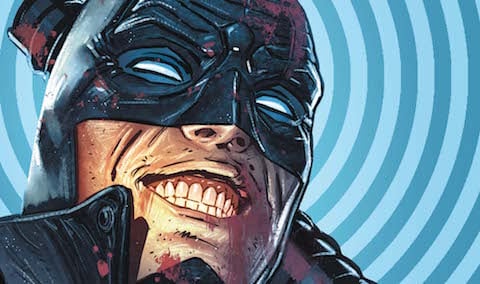
Last weekend, you didn't need to have any powers to be part of something super. New York's LGBT comic-con, Flame Con, didn't just make history as the first of its kind in the city, but its 2,200 attendees also made it one of the largest.
It wasn't just the scale that made it so special. The event, held at the historic Grand Prospect Hall in Brooklyn, brought together a diverse crowd of comic book, video game, sci-fi and fantasy fans in a celebration of all things geeky. While comic cons have long been a refuge for folks who felt like outsiders, the recent surge of geek culture in mainstream film and television has made events like San Diego Comic Con and New York Comic Con increasingly overwhelming. Flame Con's unique, thoughtful approach created a space for queer fans and creators like no other.
From the gender-neutral bathrooms to the pronoun-preference tags attendees wore throughout the event, it was clear that purposeful inclusivity was the order of the day. Artists spanning gender identities, sexual orientations and races lined the rows of the exhibition sharing original works of art, T-shirts and more. There were drag queens dressed as X-Men, scantily clad costumed characters and more than one gender-swapped Jubilee.
Sure there was spectacle, but there were also panel discussions focusing on issues like transgender themes in comics, diversity in new media and queerness in young adult fiction. We had the privilege of moderating a panel titled “No More Mister Nice Gay: Uber Violence In Queer Storytelling” with DC comics scribe Steve Orlando and writers of the webcomic Bash Back, Lawrence Gullo and Kelsey Hercs. Orlando has been writing Midnighter, a series about an openly gay vigilante that only one issue in has already featured the titular hero's Grindr profile and enough creative violence to make Tarantino squirm. Bash Back, on the other hand, is building a narrative that puts a queer spin on The Godfather, with an intriguing tale that, as the title implies, doesn't shy away from a good fight.
We discussed their inspirations, the connection between sex and violence and why these stories resonate with a queer audience. See some of what they had to say below.
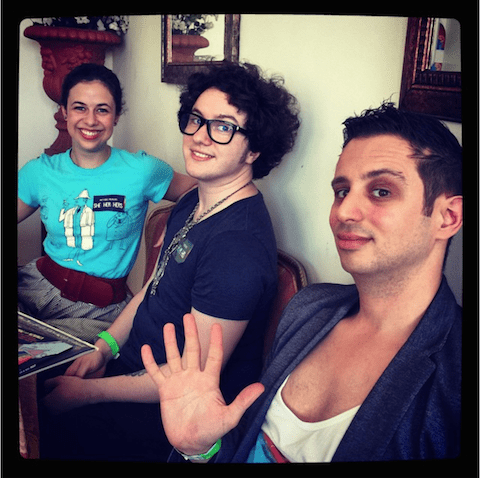
Towleroad: Lawrence and Kelsey are co-writers of Bash Back, which is an amazing webcomic. Tell us a bit about the comic for those who haven't yet had the chance to check it out.
Lawrence Gullo: We decided to make Bash Back because we wanted there to be a gay mafia thriller kind of genre that's not just the butt of a joke about how there are so many gays in Hollywood. It was inspired by The Godfather and general Quentin Tarantino violence. It's meant to be a cathartic. It's meant to be a fantasy that we have a secret bad-ass family that's there to protect us and fight for us. We're trying to use those tools that are on the table. In the comic we're following a character who is sort of like the Michael from The Godfather, who's not aware of it yet, but becomes embroiled in this crime family who is mainly about protecting LGBT people who are disenfranchised.
Kelsey Hercs: Yeah, it was really exciting to write something where everyone was hyper-competent, like competence porn, and problems could be solved with a few keyboard smashes from the really, really smart computer people and the violence is mostly meant to be really, really over the top and just feel really good to see.
TR: Steve, Midnighter is a character that comes with some history. I'd love to hear a little about your take on the character and what you're doing with him.
Steve Orlando: The character itself has been around since 1998. It was important to me, because when I was younger, I picked him up when he debuted. At the time, it was a different type of a character. He didn't act as a stereotypically gay guy would, and he didn't really give a sh*t who disagreed with him. And young Steve was heavily impacted by that. There is certainly no one way to be queer, and at the time that message wasn't really coming through. Flash forward 17 years later, DC is asking me who I want to work on, and it was my first answer. I think it's an important character even today, it's an important message even today to have this lack of fear, to have this lack of shame and to sort of own your own style, your own way of being queer. Whether it comes to being a vigilante, whether it comes to being a gay man, there's no closet for him. So he's kind of like a leather wearing Henry Rollins.
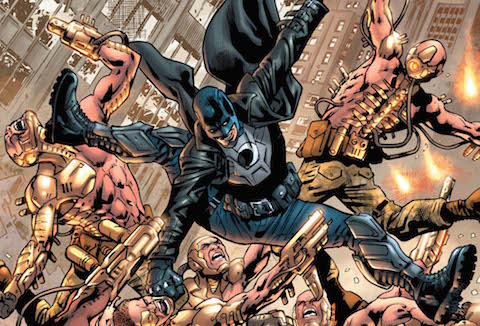
TR: Where are we finding Midnighter now when we pick up with him during your run?
SO: When you pick up issue one, you don't have to know anything to pick it up. He is launching out of an appearance he had in a book called Grayson, which is also fun, because it really does put the stereotypical male gaze upon women onto a man. Grayson's ass itself is famous on the internet. It has its own Tumblr. So, I'm on board with that. We've launched our book though, and it really is its own thing. He's walked out on his old job, he is on a break with his former boyfriend, Apollo. We're seeing him enter the community and living life as an active gay male for one of the first times in comics. Especially mainstream comics I should say, in a [Marvel or DC] book, we're getting to see him explore that. We're not ashamed of it, we're excited about it. We're very positive about it, and presenting it very frankly with the confidence I think the character would want it to be seen with. He's entering the community, he is a community-type hero. He's based on The Shadow, who, even in the ‘40s created a community around his acts. So Midnighter is doing the same thing in 2015 and being a socially active — and a sexually active — vigilante.
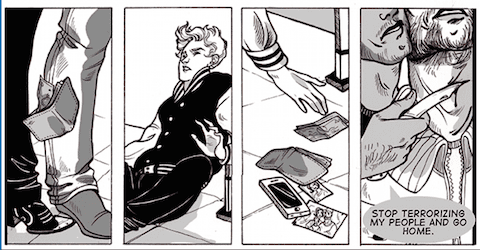
TR: On the Bash Back about page, one of the first things that jumped out at me about the project was a reference to a quote from Michael Swift that describes Bash Back, in part, as “an eruption of inner rage, on how the oppressed desperately dream of being the oppressor.” Why does that resonate with you and connect with what you're doing with Bash Back?
LG: I found that quote very inspiring and very apt to describe what we're going for with this comic. We didn't want to make any apologies for the graphicness of it, saying we're just picking up the tools that are already on the table, we're taking all of this really strong violence that's usually portrayed against us and turning it around. We're taking sort of the place we're supposed to be, where we're supposed to be victims and we're supposed to be sexless best friends, and we're supposed to be the really non-threatening aspect of whatever story, and turning that around. Instead of having queer-coded villains, we're having really bad ass heroes, anti-heroes, and that was really important to say. This isn't us just trying to be graphic and be button-pushing. This is us trying to release this inner rage that's been building up for a long time.
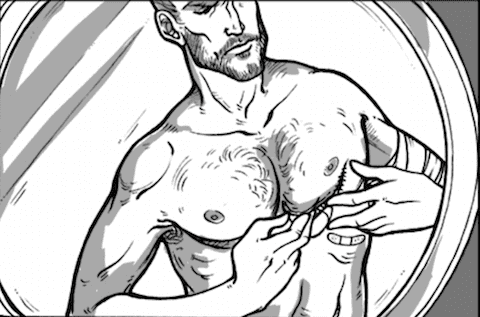
TR: With the countless acts of violence perpetrated on LGBT people every day, violence is still a big part of the LGBT community and our lives. How does this real life context affect your work?
KH: That's the thing, wouldn't it be really cool if there was a big crime family that would have your back when something like that happened and get revenge? I know that in real life, it doesn't work like that. In real life, it's probably not a good thing to wish for, but also you still kind of wish for it a little bit.
SO: I agree. When you talk about comics, in general, and these superhero narratives, the idea of wish fulfillment is a huge thing. So, the idea that now we have Midnighter our own hero that is listening to us, I try to put that into the character, not just for the queer community, but for the sort of unrepresented world in general. He's that sort of person that's going to hear you when no one else would listen to you. At the same time, he kind of embodies that sort of anger, the built-up feelings we have in the community. I think that comes through to him. He's both, in many ways, more compassionate than a lot of other DC characters, but also much more angry when you step over the line. If you anger Batman, he's certainly not going to like kick a stake through your head, but that's totally on the table in this character's case. Passion is a big part of this character to me, and that's something we feel too. The time is now. We want this idea that, yeah, we see all these stories about people being let down by the system, so, again, what if there was this guy who doesn't give a sh*t about the system and is going to get it done and help you get it done when no one else will?
LG: Absolutely. I think we all have those feelings of choosing which path to take and choosing to try to change the system and work with the system and try to be Mr. Nice Gay and try to calm everyone down and be civilized. But there is definitely a part of us that just wants to flip the table, and the best way to do that is through fantasy and wish fulfillment.
TR: Steve, before working on Midnighter, you wrote a series called Virgil, which in a lot of ways was even more extreme. What is it about these sort of extreme works that excites you and what parallels do you see between Virgil and Midnighter?
SO: Well, Virgil also has a lot of people getting hit. Maybe that's just something about me. Virgil itself was in sort of a similar vein, sort of closer to what's going on in Bash Back. I went with my partner to see Django Unchained … I walked out of the theater like, ‘Wow, if Quentin Tarantino had balls, he would have made Django gay.' And so that's what I did, and that's what Virgil is. It's queersploitation instead of blacksploitation. It's a revenge story set in Jamaica, which does not have a great track record with human rights, and I thought was important to see. The cast is almost entirely of color, and it's just such a different story than we normally see — with a gay male lead, with a non-white cast. … And, as you said, there's plenty of violence in it. There's plenty of gay sex in it. The artist was straight and I legitimately had to send him like screencaps of pornography to show him where things went. Like after numerous, numerous ‘this is where this goes' conversations, he still drew a man having sex with his thigh, so I had to go in and like move the ass over. Anyway, that's the secret history of Virgil.
TR: On that note, both series confront sexuality and sexual situations, and I feel like sex and violence are often easily conflated. So, what's the relationship in your work between the extreme violence and how you approach portraying sex?
SO: For me, the sex in Midnighter might be different than in Virgil or something more aggressive. When I approach the gay characters in the book, of which there are numerous, my idea is I want to present it with just as much nonchalance as we sort of want in our day-to-day life. We don't want to be made a spectacle, we don't want to be stared at as different. I don't think that the narrative should either. A lot of people reacted to that in issue 1. People said, ‘Wow, it was just as frank as you would have with a straight scene,' and I think that's really important. We devote time to it, we devote sort of passion and thought to it, but at the same time, we devote just as much time to it or I'm blocking the same amount of time to it as if I were writing Grayson or Green Arrow or something like that. I worry that if you put too much of an undue spotlight on it, you are perhaps in a subliminal way telling people that this is something to stare at, this is something that is not normal. To have the story itself, the book itself, to say who gives a f*ck that Midnighter is gay to me is really important. That's how we're addressing it. You're going to see as much as you would see in a similarly-rated straight book. Which in of itself is rare. Usually, when you see two dudes even start light heavy-petting, it's automatically for mature readers. We don't think that at all. It's just as beautiful as anything else, and that's the way we're approaching it at Midnighter.
KH: For us, we haven't actually written very much sex yet, which is puzzling to me. It has a little bit, but not a ton. When all is said and done, we're probably going to have as much sex as you would in any other thriller. But I do think it's important to have it in there and to portray our characters being sexual and enjoying sex. We're definitely going to have more people really enjoying sex and being really hot and it's going to be great.
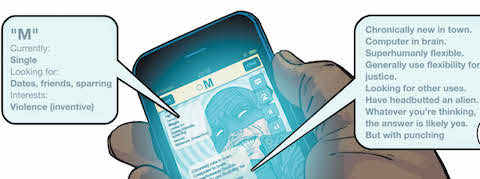
TR: So, Midnighter was historically largely defined by his relationship with Apollo. Now, this is a single Midnighter you're dealing with. Can you talk a little bit about how that plays into your take into the character? Specifically, I'd love to hear about Midnighter's Grindr profile included in issue 1. Especially at a time when so many other characters are getting attention for getting married and settling down, this approach really felt refreshing.
SO: You know, the relationship with Apollo is important, and there are a lot of things that go into the fact they're not together now. Some of them are boring narrative things and some of them are all about what is disruptive now. Boring narrative things out of the way, is the idea is that there are more eyes on the character than ever before now. And we're dealing with a relationship that longtime readers love, but you also want to give new readers a chance to fall in love with them the same way. And if they're already together when that starts out, you sort of miss out on that chance. You miss on that chance to treat that relationship with the work that it takes in the real world to make it really have a little more weight and be worth something. That's the reason I wanted to take a step back with him and really get my own grubby paws on how they get together, if they get together. But when it comes to the greater idea, for me, things have changed since 1998. Seeing them like chastely kiss on the cheek before Apollo is going to fight some aliens was a big deal back then. But now we have Cam and Mitchell every week on Modern Family. So, a chaste long-term gay relationship is not as disruptive as it was back then. But, more so, we wanted to have a chance to have a gay man being gay. There has long been this idea that you hear in mainstream media that you can have gay male characters as long as they're not being gay. And god forbid you show them with a man doing something other than making popcorn on opposite sides of the kitchen. So, that was the idea from the start. On a mental level, the book has to be just as bold and confident as Midnighter is, and he on his own is such an interesting character. We want to show him sort of living the life, how he wades into that world. His profile is part of that. At the same time, I also want to talk about how these relationships work. Apollo was his first ever. Sometimes, obviously, those things don't work out. Sometimes they do, and they work out later in life. More so, the character, as you said, it's always been Apollo and Midnighter … so the idea that we wanted to show Midnighter and who he was as a holistic being on his own, and the same for Apollo who also needs to develop that way. Then they can get back together, then they can be fully-formed people and it'll mean more than if they really are just a two-pack that aren't really saying anything by themselves.
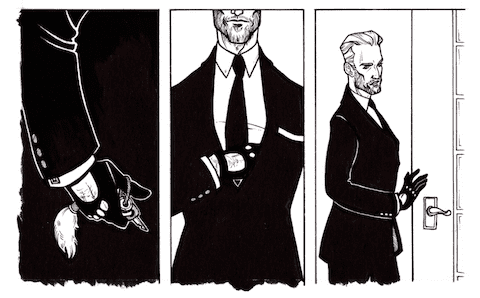
TR: So what can readers expect in these works coming up?
SO: Midnighter issue two is out July 1. It's going to be really different than issue one. The tagline for two is ‘If corporations are people, then they are people we can punch.' There will be a little bit of that. Then, issue three is probably my favorite issue so far. I mean, I love them all, obviously, but we love our children differently. At the same time, maybe we do really love one more than the others. So, issue three is a comic book wet dream for me because he's fighting a character named Multiplex who can make infinite clones of himself, so it's kind of like the gift that keeps on giving for someone who's really into creative violence.
KH: If you go to bashback.tumblr.com, you will see new pages every Monday … We have a club scene and a very, very excellent beatdown coming up very soon.
LG: I'm excited about all the characters we have yet to introduce. We've got two vets, one of whom has effects from their service that affects them mentally and another one who lost both their legs and now has badass prosthetics, which Kingsmen got to before us. But it doesn't matter, it's still going to be great … I'm very excited about all our badass characters and our tech geek that has the best comedy lines.
KH: As you're reading it, when you read the tech geeks, know that every time he says something funny, know that's something Lawrence said in conversation at some point.
This transcript was edited and condensed.



